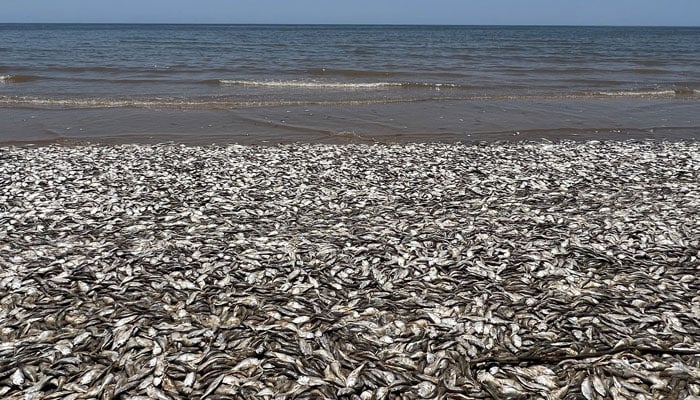Texas beachgoers find odd attraction at Quintana Beach
Experts confirmed that low oxygen levels due to rising temperatures killed fish that were found at shore
As residents of Texas headed out to catch some waves at Quinatana Beach, near Houston, over the weekend, they were dumbfounded as they discovered a sea of thousands of dead fish that had washed up on the shore.
However, visitors were not the only ones confused, a team of scientists who were there to study beach sediment were also left scratching ther heads at the sight of marine carcasses stretched for miles along the Texas Gulf Coast, blanketing both shores and shallows.
Quintana Beach County, a beachfront campground in the area, reported in a Facebook post Saturday that the fish were killed by low oxygen levels due to rising summer temperatures. Most of the dead fish were menhaden, a small fish often used for bait.
"When water temperature rises above 70 degrees Fahrenheit, it becomes hard for menhaden to receive enough oxygen to survive," the post read.
"Shallow waters warm more quickly than deeper, so if a school of menhaden are trapped in the shallows as the water begins to heat, the fish will start to suffer from hypoxia," the post continued.
According to the Quintana Beach County, the dead fish were found six miles southwest of Quintana Beach County, 10 miles away from shore.
Julia Wellner, a glacial marine geoscientist at the University of Houston, tweeted on Sunday that she and a team of sedimentologists visiting the shore were "baffled" to find the dead fish.
"Went for miles. Low oxygen sure but why here and now? Why this dramatic? Scary future," Wellner wrote.
The beach county reports that by Sunday night, workers had largely finished clearing the pedestrian beach at Quintana.
By that time, the fish had already started to rot and degrade, with some fish reduced to "shredded skeletons," the county added.
It claimed that the Texas Parks & Wildlife Kills and Spills Team had determined that the fish's demise was due to low oxygen levels in the water.
"There was NO evidence of a chemical release of any kind, so please put those theories to rest and do not spread misinformation," Quintana Beach County wrote.
Algae blooms have become more frequent and severe due to the climate crisis, with millions of fish believed to have died in New South Wales due to low oxygen levels and algae blooms on the US coast due to bacteria toxic to fish spreading rapidly.
-
Martha Stewart on surviving rigorous times amid upcoming memoir release
-
18-month old on life-saving medication returned to ICE detention
-
Cardi B says THIS about Bad Bunny's Grammy statement
-
Chicago child, 8, dead after 'months of abuse, starvation', two arrested
-
Funeral home owner sentenced to 40 years for selling corpses, faking ashes
-
Australia’s Liberal-National coalition reunites after brief split over hate laws
-
Savannah Guthrie addresses ransom demands made by her mother Nancy's kidnappers
-
Washington Post CEO William Lewis resigns after sweeping layoffs












